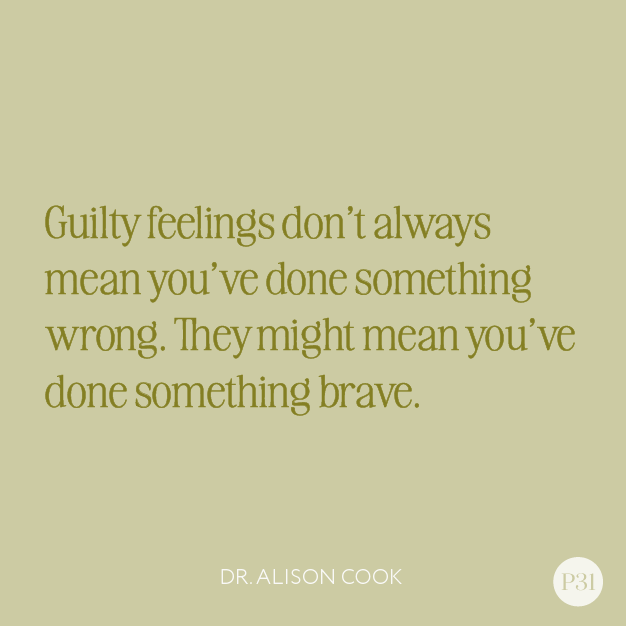
“If our hearts condemn us, we know that God is greater than our hearts, and he knows everything.” 1 John 3:20 (NIV)

As a therapist, I've noticed the obstacle most of my clients face when they need to set a boundary or make a change is guilt.
When you make a decision that’s wise for you, it often means disappointing someone else. Guilt swoops in: What if I’ve done something wrong? What if I’ve hurt someone? What if I’ve made a mistake?
But guilty feelings don’t always mean you’ve done something wrong. They might mean you’ve done something brave.
Guilt is an emotion, not necessarily a direct message from God. “If our hearts condemn us, we know that God is greater than our hearts, and he knows everything” (1 John 3:20). Therefore, braving guilt involves getting curious about it. Guilt has important information for you, but it doesn’t always have the full story.
It’s helpful to distinguish between true guilt and false guilt.
The messages of true guilt show up after you do something wrong, when you can name the thing you did wrong. I was too harsh with my kids. I lied to a friend. I betrayed someone’s trust. True guilt involves a clear prick of the conscience, followed by clarity — empowering you to change your behavior, apologize or make amends.
The messages of false guilt show up when you haven’t done anything wrong. You can’t name an actual thing that you did wrong. You feel a vague sense of not measuring up to some impossible standard either you or someone else has set. I feel guilty that they feel disappointed. I feel guilty that I’m not available to my kids 24/7. I feel guilty that other people are suffering.
The solution for false guilt is to reframe it gently, giving it a new name — one that more accurately describes what you’re feeling.
False guilt often protects you from facing more vulnerable and challenging emotions: sadness, fear, helplessness. I’m sad that I’m disappointing my friend. I’m worried I’m letting my kids down. I feel helpless that I can’t improve their situation.
In this case, guilt is a misnaming. Of course you don’t want other people to feel disappointed, hurt or let down. But it’s not helpful to tell yourself that these things are exclusively your responsibility.
When you experience false guilt, you essentially feel guilty for being human — for not being omnipotent, omniscient and omnipresent. In other words, you feel guilty that you’re not God.
The good news is — you’re not. You’re finite, limited. We all are.
The right response to guilt in this case is acceptance of your human limitations: surrender. When you surrender, you reframe your expectations of yourself.
Guilt says, “I’m letting people down.”
Surrender says, “I’m limited, and I’m a beloved child of God.”
Guilt says, “I should be perfect.”
Surrender says, “I’m not perfect, and God’s grace is enough.”
Guilt says, “I should have done more.”
Surrender says, “I gave my best, and I have to trust God with the rest.”
The antidote to false guilt is a radical acceptance of your dependence on God. It’s choosing to bravely honor the reality of your human limitations.
God, I don’t want to disappoint anyone or make a mistake. I don’t want other people to suffer. But You ask me to be brave. Help me trust You with what’s not mine to control. In Jesus’ Name, Amen.
For a practical guide to working through guilt-driven emotions, grab a copy of Dr. Alison Cook’s book I Shouldn’t Feel This Way: Name What’s Hard, Tame Your Guilt, and Transform Self-Sabotage into Brave Action.
Check out Dr. Alison’s podcast, The Best of You, for more Christian mental health resources.
Enter to WIN your very own copy of I Shouldn’t Feel This Way by Dr. Alison Cook. To celebrate this book, Dr. Cook’s publisher will give away 5 copies! Enter to win by leaving a comment here. {We’ll randomly select 5 winners and then notify each one in the comments section by Monday, June 17, 2024.}
1 Samuel 15:22b, “To obey is better than sacrifice, and to heed is better than the fat of rams” (NIV).
Where do you notice false guilt in your life? How might you surrender that guilt to God?
© 2024 by Dr. Alison Cook. All rights reserved.
Proverbs 31 Ministries thanks Nelson Books for their sponsorship of today’s devotion.
Click here to view our policy on third-party links.
Join the Conversation